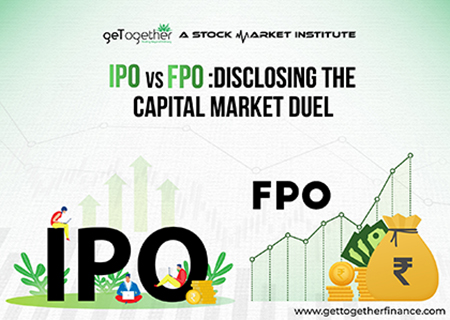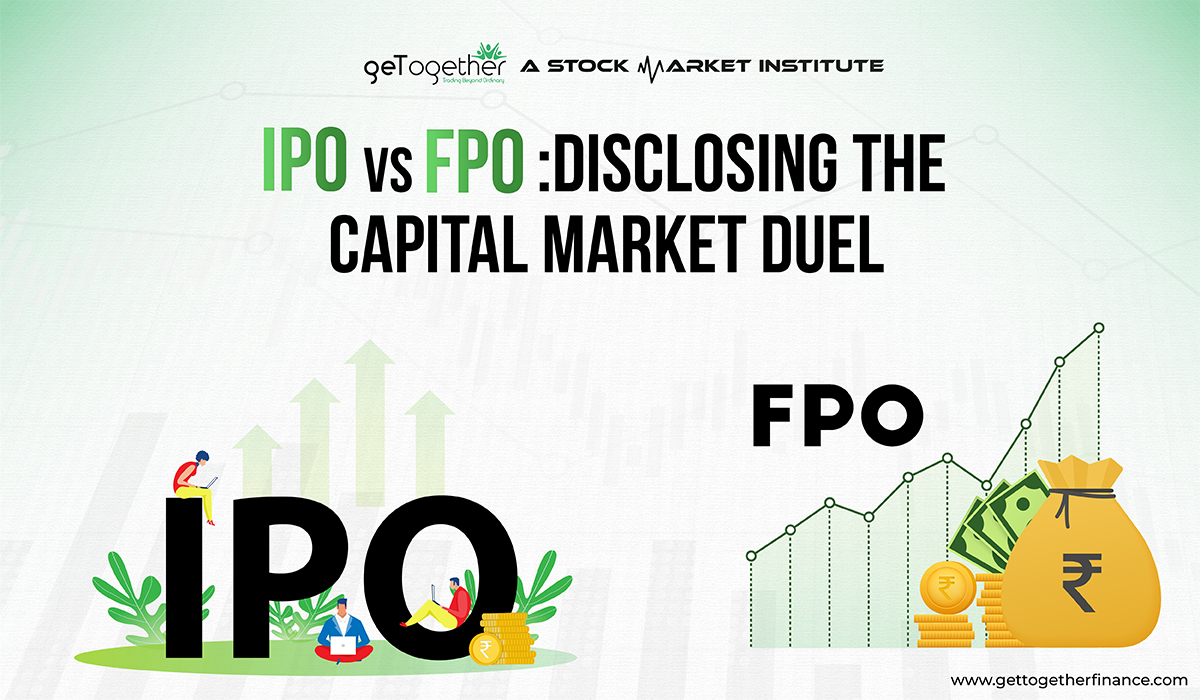IPO Vs FPO: Disclosing the Capital Market Duel


Table of Contents
ToggleOverview
As they say, If you want to play the field, firstly you have to know the field same goes for the stock market. If you want to trade or invest in the stock market, first you have to know the market. There are some basic investment terms like IPO & FPO that emerging stock investors should know about before starting the stock market investment journey. IPO and FPO are the two basic fundamental ways where a company raises its money from the equity or stock market.
Key Difference between IPO and FPO

Here are the key differences between IPO and FPO:
| Particulars | IPO | FPO |
| Motive | First Issue of Shares to raise capital | Issuance of shares to raise additional capital. |
| Price | Fixed or variable price range | Price is driven by market |
| Risk | High Risk | Less risky |
| Status | Unlisted Company | Already listed company |
| Share Capital | Increases because of new issuance | No. of shares increases in dilutive FPO while remains same in non-dilutive FPO. |
IPO – Initial Public Offering

When establishing or initiating a new company one would often consider using their personal savings as initial capital. Also, tend to get financial support from family or friends to ease out their startup process.
Day after day when the company starts growing, the requirement for funds increases. To fill that requirement, companies take loans from the bank or approach, corporations, investors, and venture capital.
As time passes, a business or company aspires to grow higher and higher, and in order to get that, one may need extra capital to expand. At that point in time IPO comes into the play.
Ultimately you will have to raise capital from the general public which is known as an IPO. In simpler words whenever a company offers its shares to the public for the first time, it is known as an Initial Public Offering. In which the company offers its shares to the public through the primary market. To make it easier one can say companies collect the funds through the Initial Public Offering which is used in their growth, expansion, and development.
Through the process of Initial Public Offering, an unlisted company can get listed on the stock exchange.
Also Read: IPO Market
What does it mean for the company?

When we invest in the Initial Public Offering, companies get their funding from it. Funds come with a huge responsibility to the company. Companies need to ensure effective management and growth so that their shareholders do not run into losses.
If you see it from the investor’s point of view by investing in an IPO, you become a part owner of that company which means if you buy shares of an XYZ company then you will become a part owner of that XYZ company.
Types of IPOs

There are two types of initial public offerings such as fixed price, and book-building.
Fixed Price:
As from the name, it is very clear that the company or firm fixes the price of shares and does not manipulate or alter them throughout the bidding process.
Book Building:
Investors play the role of godfather in book building, where they only establish the price of shares through the process of bidding.
Dutch Auction IPO
A Dutch auction IPO is is an auction where investors place bids for a security offering and specify the buying price and quantity. Basically, it is an auction where the auctioneer or the company starts with a very high price then incrementally lowers it till some places a bid.
Facts about IPO

When you purchase a share of a company, the price is decided by the seller and the buyer but it is different in the case of an IPO. The price of the share is decided by the company’s owner.
Let’s think of it that way, if you are the owner of a company, you would obviously want your shares to be sold at a higher price to gain maximum profit out of it. Because of that many company’s share tends to become expensive or overvalued that’s why investing in an Initial Public Offering is not necessarily the right decision every time.
Sometimes it happens that because of the hype of an IPO people invest in it, but later on it comes to its actual price, If somebody has invested for the purpose of long-term, they can face some loss in that situation.
Although it helps in greater capital market access, raising money, increasing brand equity, and greater liquidity for investors.
FPO- Follow On Public Offer

Earlier we have already seen that when a company issues their shares to the public for the first time and gets listed, then it is known as an IPO But if a company that is already listed on an exchange, issues new shares to the investors and the existing shareholders or raise the fund through the public then it is known as FPO which stands for follow on public offer.
What does FPO mean for the company?

FPO can be exercised for various reasons:
If a company wants fund for a new project or want expansion, then it can offer FPO. People mistakenly tend to understand Follow On Public Offer as the Right Issue but it is totally wrong and different. Only existing shareholders can participate in the Right Issue. But that’s not the case for Follow On Public Offer.
Anybody can invest in Follow On Public Offer, whether it is an existing shareholder or a non-existing shareholder they both can participate in it.
Although FPO has a high probability of increasing capital, at the same time there is also a probability of dilution of an EPS (Earning Per Share).
Types of FPOs

Unlike Initial Public Offering, there are only two types of Follow On Public Offer dilutive and non-dilutive.
Dilutive:
In this, the company issues an additional number of shares for the public to buy in the market However, the company remains of the same value. Which results in reducing the price of shares and automatically results in reducing the EPS (earnings per share).
Non-Dilutive:
In non-dilutive FPO, the large shareholders of the company let’s say the board of directors or founders sell their privately held shares in the market. Which results in an increased number of shares available for the public, unlike dilutive FPO. This method does not alter the number of shares of the company and most importantly it does not affect the company’s EPS.
What does it mean for Investors?

FPOs directly impact the existing shareholders of the company as it dilutes their ownership percentage representing a small piece of share of the company. Furthermore, it affects the stock price because the shares offered at discount attract buyers and hence results in lowering the market price in the short term. Before investing in FPO, investors should evaluate the purpose and timing of FPO.
INVESTOR’s POINT OF VIEW ON IPO Vs FPO

If we look from an investor’s point of view, in the case of FPO, we see management strategy, background, and business model. So it is easy to analyze whether we should invest in it or not but if we talk about an IPO we need to be more cautious in that.
Because a company would not give its shares at a discounted price, you need to carefully evaluate its valuation. Even if you are paying a premium price company should have a growth potential. One should choose according to their own suitability on the basis of all the information.
Other than that whenever you invest in an IPO to increase your chances you tend to use multiple demat accounts because of that your amount gets blocked for 10-15 days. Because you will apply at least one lot from an account that still doesn’t give you the surety that you will get the allotment.
Conclusion
Investment in an IPO and FPO no doubt gives benefit to the company and to you too but with a fair share of risk involved in it.
While investing in an Initial Public Offering, you must have to have a good capacity to digest the risk because you do not have much idea about the company, But it is different for FPO which is relatively safer than the IPO because it is already a tried and tested company which running in the long run.
If you consider yourself a long-term investor and have a great appetite for risk with high hopes in the company then you can consider investing in an Initial Public Offering as it has more potential to return your money if the company kicks off on a good note. as one says, risk and returns are correlated, so one must take an informed decision.
When does a company decide to go for an Initial Public Offering?
The company chose to go for an IPO when they wanted an entry into the public market to raise capital and gain wider recognition. Which allows the shareholders to monetize their holdings.
When does the company would opt for an Follow on public offer?
A company may choose to Follow On Public Offer when it is already listed on SE, publicly traded, and wants to raise additional funds for growth or expansion.
Now that we have learnt about IPO and FPO, One must read about the entity ( SEBI ) which regulates the whole market. To read more about it – Click Here



 Facebook
Facebook Instagram
Instagram Youtube
Youtube
